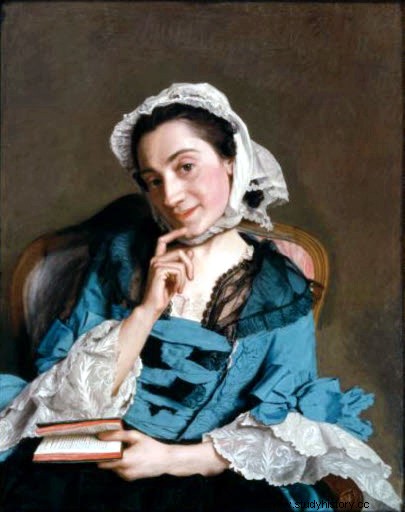Louise Florence Pétronille Tardieu d’Esclavelles (1726 – 1783) , who became Louise d'Epinay through marriage, is a French woman of letters and pedagogue.
Educational choices that go against convention
 Only daughter of Florence Angélique Prouveur de Preux and Louis-Gabriel Tardieu, Marquis d'Esclavelles, Louise was born on March 11, 1726 in Valenciennes. Her father undertakes to educate her but he is killed in 1736, when Louise is only nine years old. Her unloving mother cared little for her education and sent her daughter to a convent the following year. However, Louise only stayed there for a little over a year.
Only daughter of Florence Angélique Prouveur de Preux and Louis-Gabriel Tardieu, Marquis d'Esclavelles, Louise was born on March 11, 1726 in Valenciennes. Her father undertakes to educate her but he is killed in 1736, when Louise is only nine years old. Her unloving mother cared little for her education and sent her daughter to a convent the following year. However, Louise only stayed there for a little over a year.
At the age of nineteen, in 1745, she was married to her first cousin Denis-Joseph Lalive, Marquis d'Épinay, and by marriage became Marquise d'Epinay. They have two children, a son and a daughter who dies at a young age. Very attached to her children, Louise comes up against the conventions linked to her rank and in particular causes scandal by choosing to breastfeed. The incomprehension or even the hostility that she encounters in her educational choices will be a cause of frustration and suffering for her; moreover, her marriage is a disaster due to her husband's infidelities. In 1748, a separation of property was pronounced and provided Louise with a certain financial comfort.
Letter writer and essayist
Very early on, Louise d'Epinay frequented the literary salons of her time and herself received famous writers in Montmorency. Through her lover Louis Dupin de Francueil – future grandfather of George Sand with whom she will have two children – she notably meets Jean-Jacques Rousseau, with whom she becomes friends. They will mutually influence each other on pedagogical issues before falling out. She then met Baron Grimm, who would become her lover, and frequented the intellectuals of her time:she notably received Diderot, D'Alembert, Marivaux and Montesquieu.
She writes herself. In 1752, she published My Happy Moments then, in 1758, the Letters to my son where she develops theories on the education of children against the current of the ideas of her time. In the 1760s, while Rousseau was working on his Confessions, Louise feared that he would spread gossip about her and began writing pseudo-memoirs (entitled Histoire de madame de Montbrillant ) in which, using pseudonyms, she justifies her life choices and attacks Rousseau. This voluminous work is considered a masterpiece of women's literature of the 18th th century. In 1773, she published the Conversations d'Emilie , a mother-daughter dialogue that is more like a pedagogical treatise for the education of her granddaughter; its second edition received the utility prize of the French Academy in 1783.
Louise d'Epinay died on April 17, 1783 in Paris, leaving in addition to her writings an abundant correspondence addressed to Rousseau, Diderot, Voltaire...
